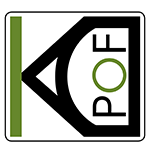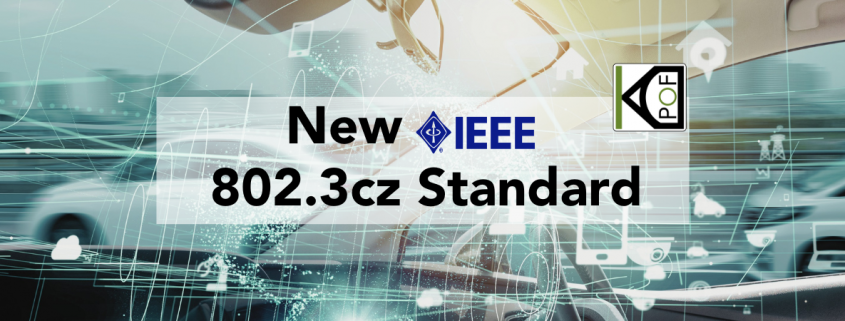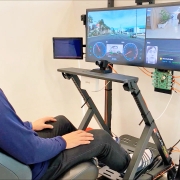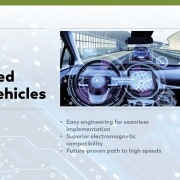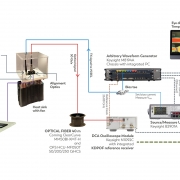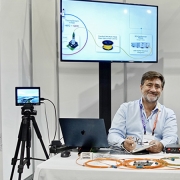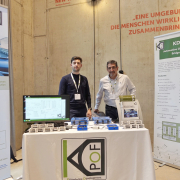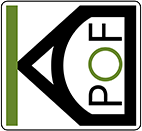KDPOF Endorses IEEE 802.3cz Standard Entering the Finishing Straight of Final Release
KDPOF celebrates the advance of the proposed IEEE 802.3cz standard to the IEEE 802.3 Standard Approval Ballot stage.
“We are happy that the IEEE 802.3 automotive optical multi-gigabit standard draft has entered final review for publication,” stated Carlos Pardo, KDPOF CEO and active participant in the IEEE 802.3 working group. “We have started the development of prototypes, led by OEMs in Europe, Asia, and North America, for the proof-of-concept (POC) of optical 10GBASE-AU links for backbone, camera, radar sensor, and display use cases.”
Prototypes in Development for 10GBASE-AU Proof-of-Concept of Optical In-vehicle Multi-gigabit Links
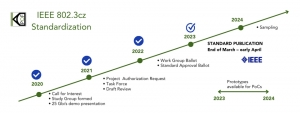
The 802.3cz standard draft for the automotive industry specifies speeds starting at 2.5 Gb/s and going up to 50 Gb/s (nGBASE-AU). The 802.3 Task Force includes numerous individuals affiliated with key carmakers, such as PSA, Toyota, BMW, Ford, GM, and Volvo; Tier 1 suppliers; and components suppliers. Jointly, various industry leaders have been working on an optical automotive multi-gigabit system that will fulfill the needs of future connected and automated vehicles. “We are very thankful and positive about the strong support from the industry,” added Pardo.
Future-ready Optical Multi-gigabit Connectivity for Vehicles
The proposed IEEE 802.3cz automotive optical multi-gigabit standard draft specifies 2.5GBASE-AU, 5GBASE-AU, 10GBASE-AU, 25GBASE-AU, and 50GBASE-AU physical layers using bend-insensitive OM3 glass fiber from leading suppliers. The draft standard optical specifications will allow the use of reliable light sources based on proven technology. The multi-gigabit capabilities the draft standard specifies will also be critical for the continued evolution of driver-assist and ultimately autonomous vehicle operation. A specially dedicated Operations, Administration, and Maintenance (OAM) side channel will be available for dependability and link management. The draft standard also includes error correction capabilities to provide bit error rates better than 10-12, something critical but also challenging because of the harsh electromagnetic environment in automotive applications. The absence of retransmissions means controlled latency and jitter for video distribution.
The proposed multi-gigabit system wakes up in less than 100 ms. The ambient operating temperature of automotive environments, ranging from -40 ºC to up to 105 ºC (AEC-Q100 grade 2), is more challenging than traditional networking applications, as is meeting OEM reliability requirements (minimum of 15 years of operation with 10 FIT). Outstanding EMC compliance will also be fulfilled. The technology in development is based on advanced digital signal processing, using high-speed DAC and ADC to implement all needed algorithms such as adaptive equalization or pre-coding.
KDPOF will present their latest demo setup, demonstrating automotive high-speed links with connectors from leading suppliers like MD Elektronik and Yazaki, this March 14th at the Embedded World international trade show in Nuremberg, Germany, together with Würth Elektronik at stand 110 in hall 2. In addition, KDPOF will show the demo at Automotive Ethernet Congress from March 22nd to 23rd, 2023 in Munich, Germany.
For Automotive Ethernet Congress, we’re happy to pass on a 10 percent discount to our customers. Please use the code AEC2023EXCUS for your registration.
We look forward to meeting you! Please contact us to set up a date.
